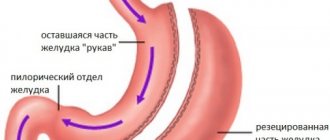250 856
16.02.2022
7 minutes
Author, editor and medical expert - Klimovich Elina Valerievna.
Editor and medical expert - Harutyunyan Mariam Harutyunovna.
Heaviness in the abdomen, nausea and belching, which usually occur after eating, are referred to by doctors as “dyspepsia”.
According to statistics, stomach upset is regularly experienced by 25% of adults, and in some cases it is combined with diarrhea1,2.
Symptoms of dyspepsia1,2
- Discomfort in the epigastrium - the upper part of the abdomen under the sternum, where the ribs meet. The intensity of sensations varies from person to person: from heaviness and burning to cutting and squeezing pain that appears after eating. At the same time, the pain is never very strong and does not radiate to other parts of the abdomen.
- A feeling of fullness in the stomach after eating a small amount of food, forcing you to stop eating.
- Feeling of food stagnation in the stomach.
- Nausea and belching.
Dyspepsia is often accompanied by symptoms of digestive disorders: bloating, rumbling and heaviness in the abdomen, stool disorders, including diarrhea caused by concomitant intestinal disorders2.
Causes of indigestion
Both problems in the upper gastrointestinal tract (GIT) and digestive disorders in the intestines can lead to abdominal discomfort2.
Moreover, in 2/3 of cases, dyspepsia is functional in nature , that is, it is not associated with any gastrointestinal diseases or systemic pathology2.
Symptoms of a functional stomach and intestinal disorder may occur:
- as a result of overeating and consuming large amounts of indigestible fatty and carbohydrate foods2;
- after drinking alcohol2;
- against the background of psycho-emotional stress, high levels of anxiety and depression2;
- after taking certain medications, such as non-steroidal anti-inflammatory drugs and antibiotics2.
The likelihood of dyspepsia increases in the presence of gastrointestinal diseases in close relatives, impaired motor function of the stomach and intestines, infection with Helicobacter pylori bacteria, which cause the development of gastritis and the formation of ulcers in the stomach1,2.
In 30-50% of cases, dyspepsia is combined with irritable bowel syndrome (IBS)2.
Functional disorders in the gastrointestinal tract are rarely permanent1. If abdominal discomfort persists for a long time, you need to look for organic diseases1,2:
- chronic gastritis,
- peptic ulcer of the stomach and duodenum,
- chronic pancreatitis,
- cholelithiasis,
- malignant tumors of the digestive organs,
- dysfunction of the thyroid gland,
- diabetes,
- systemic connective tissue diseases,
- disorders of electrolyte metabolism.
In the above cases, medications are unable to counteract indigestion. You need to see a doctor for examination and treatment of the disease that is causing the discomfort.
Precautions for stomach upset
Gastrointestinal discomfort may be the first manifestation of a serious organic disease.
There are a number of so-called “alarming symptoms” in which you should not buy pills for intestinal upset, but rather consult a doctor without delay to rule out tumor diseases.
"Warning signs" include1:
- constant abdominal discomfort;
- rapidly progressing dyspepsia (development within 6 months);
- pain when swallowing, a feeling of difficulty passing food through the pharynx and esophagus;
- frequent vomiting, especially with blood in the vomit;
- weight loss due to normal diet and lifestyle.
Doctors are especially wary of the appearance of these symptoms in people over 45 years of age and with a family history of cancer1. In such cases, urgent endoscopic examination is mandatory1.
Attention! Symptoms of dyspepsia, such as epigastric pain, may be the first manifestation of myocardial infarction1 and acute intestinal circulatory disorders - diseases requiring emergency medical attention1. In these cases, the question “how to treat stomach and intestinal upset” should not arise at all.
The need for emergency medical care is indicated by the following signs:
- sudden symptoms of dyspepsia that are not related to food and are accompanied by shortness of breath, sweating, and increased heart rate;
- if symptoms of dyspepsia occur every time during physical activity and go away at rest;
- when the symptoms of dyspepsia appear acutely, accompanied by severe abdominal pain.
Inflammatory bowel disease (IBD) is a chronic inflammatory process involving the entire intestine or part of the gastrointestinal tract (GIT). This usually leads to abdominal pain and diarrhea, and sometimes extraintestinal symptoms may occur: inflammation of the joints, skin rashes, inflammatory eye lesions.
The causes of this pathology are still not precisely known, although the involvement of the immune system and genetic factors is assumed.
The main inflammatory bowel diseases are ulcerative colitis (UC) and Crohn's disease.
They also include collagenous and lymphocytic colitis, but they are usually considered separately from the main types of IBD.
The course of IBD can be long and debilitating; in addition, life-threatening complications sometimes occur: bleeding, the development of an oncological process, inflammation of the abdominal cavity due to intestinal contents entering it through a defect in the intestinal wall.
Drug therapy is often successful, leading to the disappearance of symptoms for a long time. If it is ineffective, surgical treatment is performed.
Synonyms Russian
IBD.
English synonyms
Inflammatory bowel disease, IBD.
Symptoms
Manifestations of the disease depend on the severity of the process and its location. In addition, there are periods of remission (complete disappearance of symptoms) that last for months or even years.
The most common symptoms of IBD are:
- chronic diarrhea with blood in the stool, sometimes mucus,
- abdominal pain, possibly cramping in nature,
- intestinal bleeding (more typical for Crohn's disease),
- feeling of incomplete bowel movement and false urge to defecate,
- anal fissures (characteristic of ulcerative colitis),
- fistulas (pathological passages connecting the intestine with the external environment or with another intestine in the wrong place; typical for Crohn's disease)
In addition, there are a number of extraintestinal symptoms:
- general weakness and malaise,
- temperature increase,
- loss of appetite and body weight,
- anemia due to bleeding and impaired iron absorption.
Sometimes joint pain, inflammatory eye lesions, red, bumpy, painful rashes appear on any part of the skin.
General information about the disease
Inflammatory bowel diseases are chronic, recurrent diseases that affect the gastrointestinal mucosa.
Currently, the cause of IBD is not completely known. They are believed to be mainly caused by:
- disorders in the immune system, leading to its increased activity and excessive production of antibodies (protective factors) against cells of the own mucous membrane,
- genetic factors, which is why people whose relatives had it are more susceptible to IBD.
Additionally, stress and dietary patterns may increase the risk of IBD.
The main forms of this pathology are ulcerative colitis and Crohn's disease. In ulcerative colitis, the pathological process is localized in the colon, the inflammation is continuous and affects only the upper layers of the mucous membrane, without penetrating deep into the tissue.
In Crohn's disease, any part of the gastrointestinal tract can be affected, from the oral cavity to the rectum; inflammation penetrates deep into the tissue and is characterized by segmental damage to the mucous membrane.
Chronic inflammation leads to impaired digestion and absorption of nutrients (malabsorption), as a result of which the level of microelements, glucose, protein, and vitamins in the blood decreases, which can cause depletion of the body.
Who is at risk?
- Persons whose relatives suffered from inflammatory bowel diseases.
- Young people under 30 years old.
- Smokers (smoking negatively affects the course of Crohn's disease, but quitting it can provoke its exacerbation).
- People who frequently take painkillers (non-steroidal anti-inflammatory drugs) such as ibuprofen, naproxen, aspirin.
- Residents of megacities.
Diagnostics
If you have symptoms of inflammatory bowel disease, especially frequent, loose, bloody stools or severe abdominal pain, you should consult a doctor.
The electrolyte composition of the blood may change, the level of total protein, glucose, and vitamins may decrease. In a general blood test, a decrease in hemoglobin is likely, indicating the development of anemia and/or an increase in the level of leukocytes, which indicates an infection.
A stool examination is also used to detect digestive disorders and invisible amounts of blood in the stool.
The doctor may prescribe an X-ray or endoscopic examination of the intestine, the latter allows you to take a biopsy (a piece of intestinal mucosa) for examination under a microscope, which often helps to make a final diagnosis.
Treatment
The basis of treatment is the prescription of drugs that suppress the activity of the immune system. The synthesis of antibodies to the intestinal mucosa and the activity of inflammation are reduced.
If there is no effect of therapy, a consultation with a surgeon is necessary to decide on surgical treatment.
Recommended tests
- Complete blood count (without leukocyte formula and ESR)
- Serum albumin
- Total protein in whey
- Serum iron
- Potassium, sodium, chlorine in serum
- Serum calcium
- Plasma glucose
- Diagnosis of inflammatory bowel diseases (antibodies to intestinal goblet cells and pancreatic ducts)
- Coprogram
- Histological examination of biopsy diagnostic material
Treatment for indigestion
If stomach discomfort is functional in nature, doctors first of all recommend1,2 making adjustments to your diet and lifestyle:
- get rid of bad habits;
- normalize the daily routine;
- to avoid overwork, alternate mental and physical activity;
- follow rational nutrition rules2: eat small portions 5-6 times a day, avoid excessively fatty, sweet and starchy foods, as well as spicy, smoked and pickled foods.
When choosing medications for the treatment of dyspepsia, the doctor takes into account the prevailing symptoms. For example, in case of increased acidity and sour belching, he may recommend antacids that reduce the acidity of gastric juice, and to protect the stomach walls from the aggressive action of hydrochloric acid - alginate preparations1,2. Stomach pain associated with increased motility is relieved by prescribing antispasmodics. When symptoms of intestinal disorder appear in adults, treatment may include enzyme preparations, medications that normalize the composition of intestinal microflora, and drugs to combat flatulence, constipation or diarrhea2.
Symptomatic treatment of diarrhea may include IMODIUM® Express3. The main active ingredient of the drug - loperamide3 - reduces intestinal motility and slows down the movement of intestinal contents, which promotes the reabsorption of water and electrolytes and fecal retention4. Loperamide acts for 4-6 hours4, so in acute cases of dyspepsia with diarrhea, a single use of the drug is sufficient5.
The information in this article is for reference only and does not replace professional advice from a doctor. To make a diagnosis and prescribe treatment, consult a qualified specialist.
general description
Gastritis is an inflammation of the gastric mucosa, leading to disruption of its function, especially secretory function.
If a person has gastritis, incoming food is poorly processed, which leads to impaired absorption of nutrients for the human body. Chronic gastritis affects about 60-85% of the world's population, especially at a young age from 18 to 35 years. Due to the modern pace of urbanization, gastritis has begun to occur more often in children aged 8 to 13 years.
Gastritis is also divided according to the secretion of hydrochloric acid into:
- Gastritis with low stomach acidity
- Gastritis with normal stomach acidity
- Gastritis with high stomach acidity
Due to the presence of a certain type of gastritis in a person, different groups of drugs will be prescribed.
Literature
- E. A. Lyalyukova, V. N. Drozdov. “Unspecified dyspepsia”: differential diagnosis, tactics for patient management at the outpatient stage. Attending doctor. No. 8, 2022.
- E. I. Vovk. Functional and organic dyspepsia: “crossover” of diagnostic and treatment strategies in general practice. Attending physician. No. 9, 2012.
- Instructions for use of the drug IMODIUM® Express
- Register of medicines in Russia. Active ingredients. Loperamide. https://www.rlsnet.ru/mnn_index_id_637.htm.
- A study by Ameri et al. "A multicenter, double-blind study: a comparison of the effectiveness of loperamide in acute diarrhea with two popular antidiarrheal agents and placebo," 1975.










